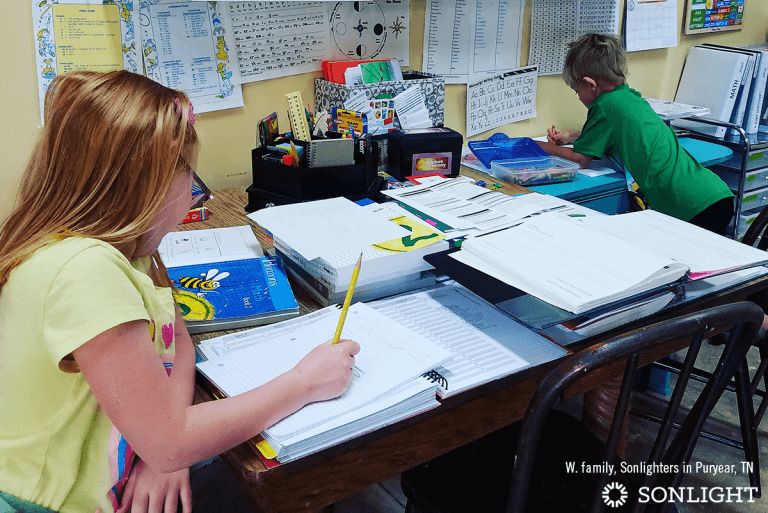
Most homeschooling parents are guilty of trying to do everything and then feeling like failures when we discover we can’t do it all. We want to
- check every box,
- finish every book,
- and include every subject.
And while we can readily acknowledge that we are doing more than we need to, figuring out what to give up is hard. Here are four guidelines for choosing what to drop from your homeschool schedule.
1. Drop Anything Done for the Sole Purpose of Validating Outsiders
Perhaps a family member told you that a music lessons are essential to a well-rounded education, but your children aren’t really musical. Or, perhaps you are trying several sports at once so you can find out which sport they excel at because your family feels that a sports scholarship shows a well-rounded child. Perhaps your sister-in-law insists you must do math drills daily to make sure your children are well versed in the basics, but your children are getting no educational benefit from them.
Your child’s education shouldn’t be about proving to the world who you are. Instead, focus on who your child wants to be and what they are interested in learning, and choose activities that bring peace and joy to your household. When we spend time trying to earn validation from others, we run the risk of turning into who they want us to be, not who we are. So, instead, do what makes your household happy.
2. Drop Anything Done Out of Guilt
If you are doing an activity solely because you are afraid your child is missing out on an experience, then you are doing it for the wrong reasons. Instead of looking for what your child might be missing and trying to fill those gaps, instead focus on the opportunities you are creating for your child. If you’re struggling through a book simply because you should read it, or because it’s on a list you must complete, then you are missing out on an opportunity to fill that time with a good book you might both enjoy and still learn a lot from.
Many times, we feel pressured to do what everyone else is doing. But if what everyone else is doing isn’t making us happy, then we need to instead focus on what would make our lives more enjoyable or bring more peace to our homes. I don’t homeschool my children so they can blend into the world, but so that they can stand out in it.
3. Drop Anything Causing Excessive Tension
How many times have your fought with a child over completing a math page, a handwriting page, or a reading assignment? Those battles are sometimes necessary, but just as often, they aren’t worth the argument.
Doing every page in a math book might build character, but no hard-working adult ever looks back and says, “Well, if they had let me skip that one page in my math book, I wouldn’t be the person I am today.”
Look for compromises:
- put the assignment away and find another way to teach it—maybe a game
- cross off half the problems
- choose a different curriculum with a fresh approach
- switch to a different unit and revisit this one in later months
- skip a book here or there
Here are details on two of my favorite compromise techniques.
Handwriting Hack: Highlighter Tracing
Have a child who just doesn’t want to do handwriting because it’s too hard? Try using a yellow highlighter to write out the words for them. Then have them trace.
Handwriting is largely a motor memory skill, so as long as they are practicing writing the letters and words correctly, it will work just as well to trace as to write them independently each time. Once the motor memory has memorized the skill to the point where the child can write without thinking about writing, then handwriting is complete.
Reader Hack: The 2 Skips Rule
Have a child who doesn’t want to read a certain book? If you’re using a literature-rich program such as Sonlight, your child will miss out on very little by skipping a book or two along the way. My children are allowed two skips per History / Bible / Literature (HBL). Here are the rules:
- Skip books must be approved by mom. She retains the right to refuse a skip if the book is integral to the HBL program.
- Skips can be claimed only after the child has read about 10% of the book.
- Only two books can be skipped. So if they desire to skip a third book, then they must go back and read one of the two books they skipped.
4. Reschedule Things that Don’t Need to Be Done Daily (Or Even Yearly)
It’s very easy to fall into the trap of covering every subject every day of every homeschool year. But you don't have to do it this way!
If you feel bogged down trying to fit in Bible, language arts, reading, phonics, handwriting, spelling, science, math, state history, world history, American history (or history of another country), foreign language, Latin, Greek, art, art appreciation, music, music appreciation, typing, .... consider a different approach. Although all these subjects are required, they aren’t all required every year nor all at once. When trying to fit in every subject, remember there are options besides every day Monday through Friday:
- unit study that spans multiple weeks
- semesters
- weekend intensives
- weekly co-op classes
- summer camps
Don’t do more than is required if you aren't enjoying it. If you happen to love science and can’t get enough, five or more hours may suit your family, but if all your children really want is to do some experiments every few weekends, that may be enough.
So often, we get so focused on what we are missing or not getting done that we forget to look at the big picture. If a child is learning math, does it matter if they do every problem on a page, or can they be allowed to only do the odds or evens? (The answer is yes!)
No college will care if they learn to read from a book or from a game. By making a few changes and letting go of unreasonably high expectations, a more balanced and relaxed homeschool life will blossom. When that happens, and children have time to explore and have fun, you’ll find they learn even more on their own.
Simplify your homeschool and reduce the burden of daily decision making. Try three weeks of any Sonlight Instructor's Guide for free. Click here to get one for any level, preschool through twelfth grade.










2 Comments